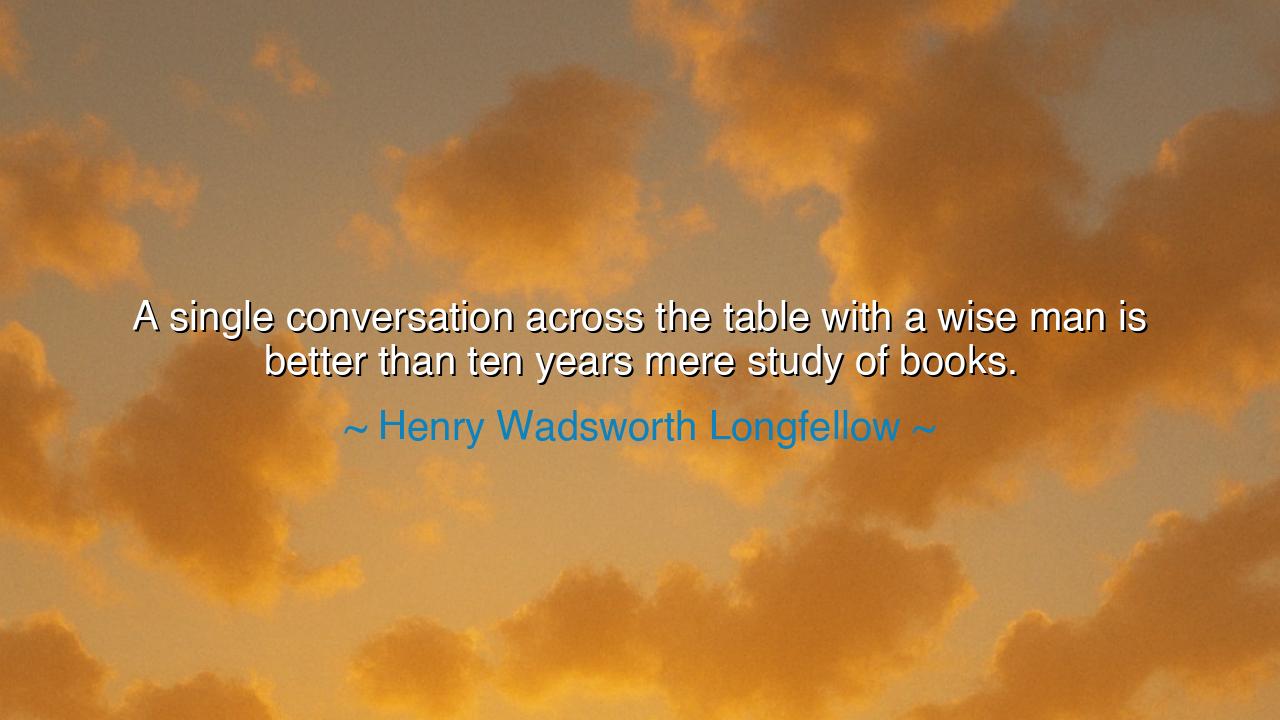
A single conversation across the table with a wise man is better
A single conversation across the table with a wise man is better than ten years mere study of books.






The poet and sage Henry Wadsworth Longfellow, whose verses carried the fragrance of wisdom and the quiet thunder of truth, once declared: “A single conversation across the table with a wise man is better than ten years mere study of books.” In this profound saying, Longfellow reveals a truth as old as civilization itself—that wisdom cannot be fully captured in ink or parchment, nor confined to libraries of knowledge. True understanding lives not in the words of books, but in the living soul of the wise, whose experience and spirit breathe life into truth. A single exchange with such a person, he tells us, can awaken the mind more deeply than a decade of solitary study.
To study books is to fill the mind; to converse with wisdom is to awaken the heart. Books are silent teachers—they hold the ideas of others, preserved and pure—but they cannot look into your eyes, cannot answer your doubts, cannot shape their teaching to your soul. The wise man, however, is a living mirror; he reflects truth as it applies to the moment, to the questioner, to the very pulse of life. His knowledge has been tested in fire—it breathes with humanity. The written word can show you the path, but the wise guide can help you walk it, steering you from error and showing you the turns you would never have seen alone.
The origin of this truth lies in the very beginnings of human learning. Before writing, before schools, before the birth of civilization itself, knowledge was passed from elder to youth, from sage to seeker. Around fires and under the open sky, men and women learned through conversation—through the spoken wisdom of those who had lived long and seen much. The ancient Greeks called this the dialectic, the sacred dialogue that gave birth to philosophy. Socrates himself, perhaps the greatest teacher of them all, wrote nothing; he believed that wisdom could only be born through dialogue, where minds meet and truth reveals itself through questioning. Thus, even in the age of books, Longfellow’s words remind us of this eternal truth: that living wisdom is superior to dead words.
Consider the story of Alexander the Great and his teacher, Aristotle. Alexander was a prince of great ambition, surrounded by wealth and access to every written scroll of his age. Yet it was not his studies alone that forged his greatness—it was his daily conversations with Aristotle that shaped his mind and spirit. Through those exchanges, he learned the art of leadership, the nature of virtue, and the principles of reason. The books of Aristotle were vast, but it was his living voice, his tone, his presence, and his response to Alexander’s questions that brought those ideas to life. Alexander himself would later say that he owed his life to his father, but his wisdom to his teacher. That is the power Longfellow speaks of: a single conversation that breathes spirit into knowledge.
The difference between learning and understanding lies in this—books tell you what, but the wise man shows you how and why. A book may teach you the theory of courage, but only the wise, who have faced fear, can teach you the heart of it. A book can describe love, but only the one who has loved and lost can explain its weight. The conversation is the bridge between knowledge and life—it transforms the abstract into the tangible, the idea into experience. It is the living flame that passes from one soul to another, and that flame burns brighter than a thousand pages ever could.
Even in the modern age, this truth remains. A person may spend years studying leadership, reading countless books on success, and yet remain untransformed until they meet one who embodies it—a mentor whose presence sharpens the mind and steadies the heart. It is why disciples sought Buddha, why students followed Confucius, why poets gathered around Rumi—because wisdom is not merely taught, it is transmitted. To sit across the table from one who is truly wise is to sit before a mirror that reveals one’s potential, one’s flaws, and one’s path forward.
So let this be your lesson, seeker of truth: cherish your books, but seek also the conversation of the wise. Find those whose lives reflect the virtues you wish to learn, and speak with them humbly. Listen more than you speak, and you will find that every word they utter is a seed that may grow for years within your heart. And when you cannot find such a one in the flesh, read the words of the great with reverence, not as text, but as a dialogue between your spirit and theirs. For wisdom is not found by accumulation, but by connection—by meeting truth where it lives.
Remember then Longfellow’s teaching: “A single conversation across the table with a wise man is better than ten years mere study of books.” For it is not how much knowledge you gather that determines your growth, but how deeply truth reaches you. Seek those who make you think, who challenge your soul, who awaken the best in you. For one moment of true understanding, kindled by the light of another’s wisdom, is worth more than years spent in the silent company of unturned pages.






AAdministratorAdministrator
Welcome, honored guests. Please leave a comment, we will respond soon